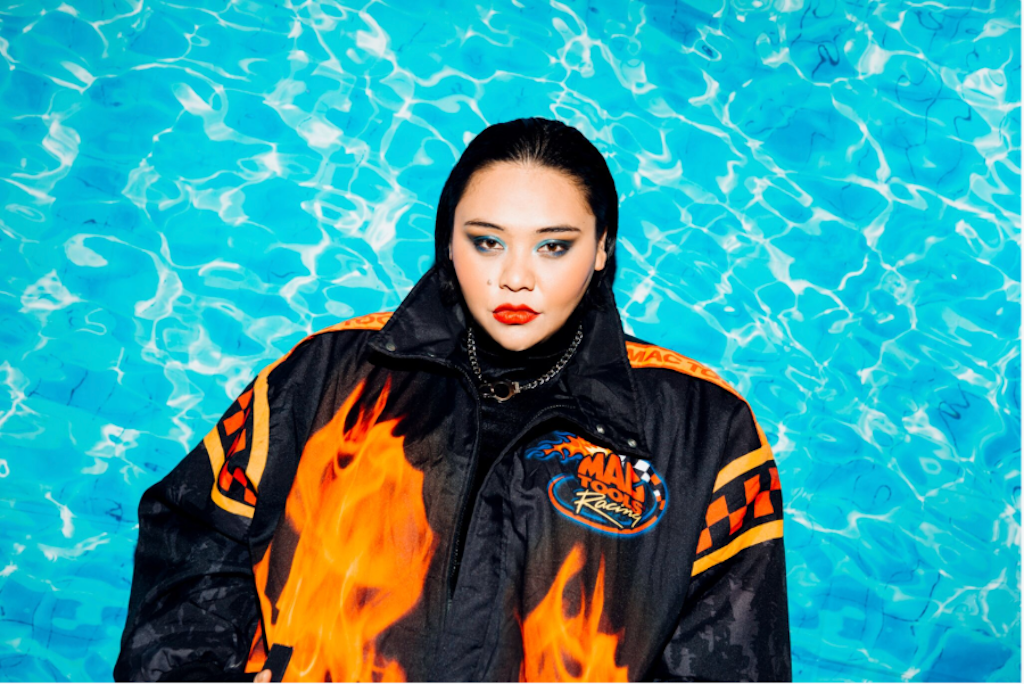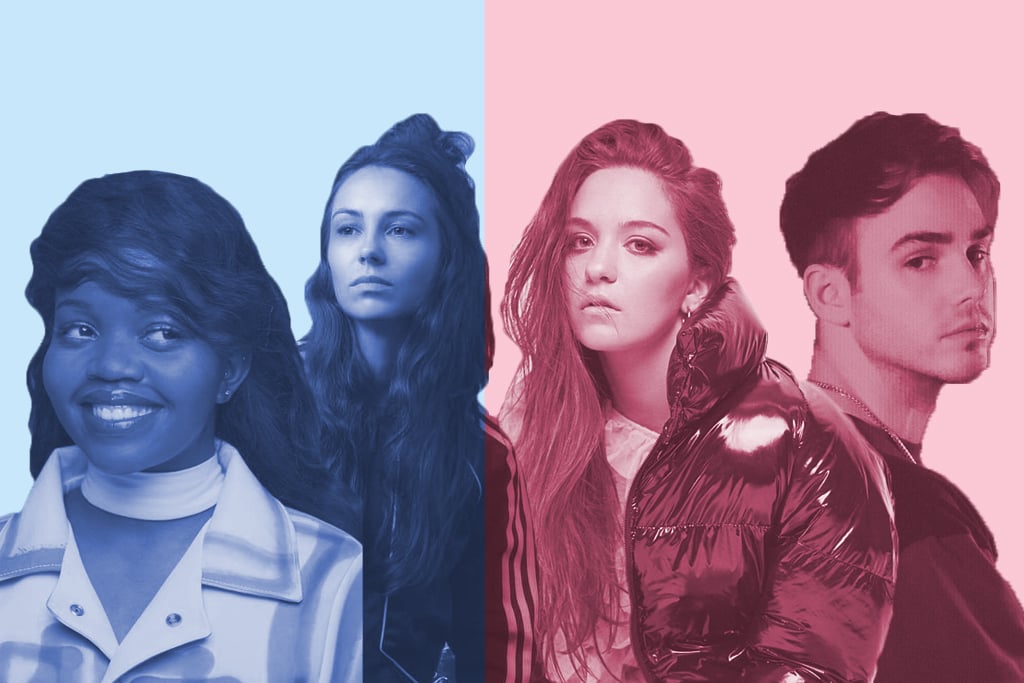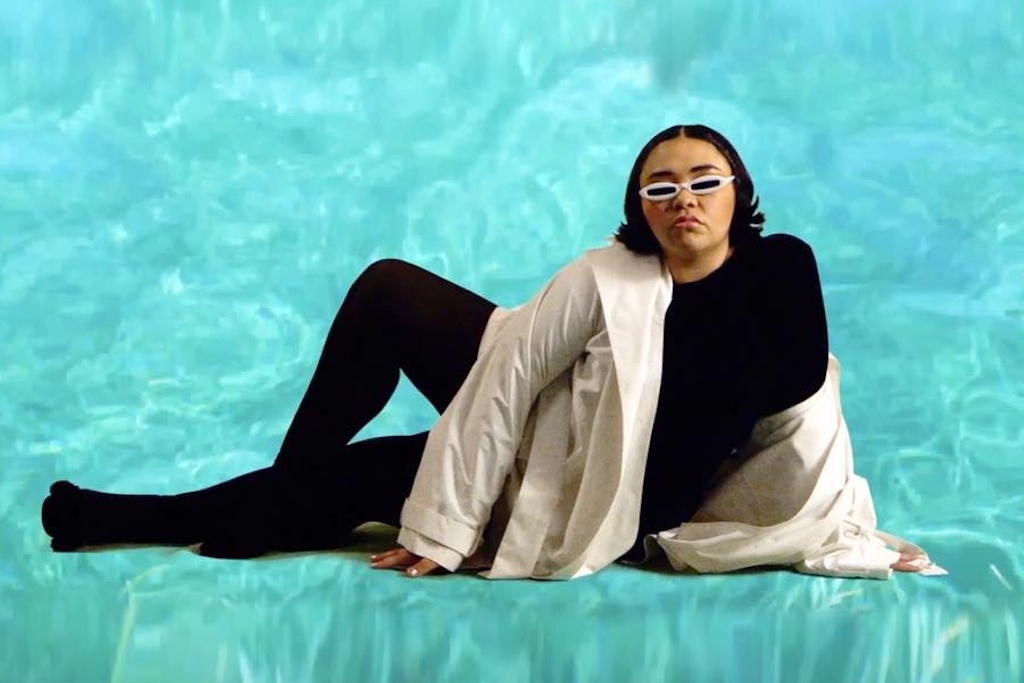Kira Puru Just Wants To Make Her Fellow Weirdos Dance
"I don't wanna waste my time being sad."

YouTube comments are normally a cesspool, but there’s a couple of crackers on Kira Puru’s bonkers music video for ‘Molotov’.
It’s a green-screen adventure through the Grand Canyon and psychedelic landscapes. Puru’s armed with champagne, those questionable tiny shades worn by Insta-influencers and the kind of dance moves most wouldn’t attempt outside of their bedroom.
Most are incredulous, some sounding like a review by your theatre-frequenting aunt: “Was not expecting it and was thoroughly entertained.” Some are a little specific: “Got those Jack Black dance moves on point!” But one speaks truth to power: “Why isn’t this everywhere?”
Music Junkee recently wrote about how Australia’s pop music is in a golden age, and ‘Molotov’ is pretty much a perfect example. Sure, the pulsating bass line and the (ahem) explosive chorus don’t hurt, but the song really comes into its own because of Puru’s stadium-ready swagger.
When she sings about starting the party, you believe it: her voice is defined not by its technical talent (though it’s clear she has that, too), but a coquette confidence — it’s infectious. It’s fun.
With the release of her self-titled EP, Puru chatted to Music Junkee about pivoting to pop, how ‘fun’ shouldn’t be a musical pejorative, and the power of a dance floor to wash away all the bullshit of the world.
You’ve released (quite blues-orientated) music previously as Kira Puru & The Bruise, but this marks your first full release as ‘Kira Puru’. Do you consider this to be your debut EP?
I feel like this is definitely the music that represents me most and feels the most like me. Music that I’ve released in the past was collaborative in the true sense, meaning that there was several people putting their artistic expression in it.
There have certainly been collaborations [here], particularly with [EP producer] Jon Hume — but I think it speaks to my personal voice. In many ways, it’s my debut because there’s so much of me in it. I just have a better sense of who I am now, a greater understanding of the things that I wanna say and who I am as a person.
Big question, but how did you reach that place of knowing yourself more?
I think the best way to find out who you are is just to make a bunch of mistakes. And I’ve fucked up so much in my life.
[Now], when I walk into a room, I’m not uncertain about what message I wanna put across to people, how I want to be perceived, what I do and don’t wanna do, or what my tone is when I speak to people.
I’ve also just had a bunch of life experiences and that allows you to channel your energy away from things that you know that you dislike and towards things that you know you enjoy. [That’s] really important in shaping who you are, and shaping how confident you are and comfortable you are in your own skin.
In an interview with Music Feeds, you talked about moving to Melbourne from Newcastle and latently giving up music for a while to lead a normal life. Was that moment one of those mistakes?
No, I don’t think it was a mistake, I was just doing what felt like the best thing for me at the time.
I was gravitating towards something that I felt would be a healthy change in my life. Music symbolically felt a bit… I dunno, I guess I was associating it with the toxic feelings that I was having, having worked so hard and feeling a bit burnt out.
But of course, as soon as I got there these wonderful opportunities came through, and I was like “I’d be an idiot to say no to that”. It wasn’t too long after that where I just fell back into making music again.
On Instagram, you called ‘Molotov’ an “anthem for people like me who struggle to fit in the daylight hours but find solace and community on the dance floor at the party with chosen family, in abandon, in oblivion, in gin”. Was that inclusive space something that you found in Melbourne?
Yeah, [and] I have it definitely in Sydney as well. I think Sydney has a thriving queer art scene: growing up in Newcastle, I had much more contact with the Sydney scene than I did with the Melbourne one.
Partying and dance floors, or events that allow you to freely and wildly express yourself — or just dance yourself into oblivion — can be safe spaces for our community.
Partying and dance floors, or events that allow you to freely and wildly express yourself — or just dance yourself into oblivion — can be safe spaces for our community. You don’t always [have] permission to be your true authentic, wild, ridiculous, weird self in daylight hours and particularly on the streets. I think there’s something really fun about making music that encourages you to dance and engage with that space, that also is mindful of that community and comes from a person of colour who is queer, plus size and a fucking weirdo.
Yeah, it’s something that I feel a lot, too: some of my most treasured memories and sense of community I experienced on a dance floor.
Yeah. I think some of [my] songs can be perceived as throw-away party songs, which indeed they can be if that’s what you choose to view them as. But also it’s important to note that that space holds so much more for me, [and] a lot of different communities feel the same way.
There’s something so nice about the fact that two people can really just let go on a dance floor, side by side, and have the best night of their lives without talking about politics, or who they are as individuals. There aren’t many spaces where you can be so intimate with somebody without having to completely agree, or to feel close to them in any other way.
There is just something romantic and nice and fun about that. In this day and age, especially with so much access to technology and [with] everyone blasting their personalities out on social media, you sort of always feel like you’re in a state of war with everything around you, bombarded by people’s opinions and bigotry and shit. The dance floor is a zen place, in that regard.
There are a few ways to describe your EP, but primarily, it’s ‘fun’, a word that people are really reluctant to use when they talk about music because it sounds frivolous. It’s clearly more pop-orientated, too — what prompted that move?
I’ve always loved pop music, and in a way this EP’s the first time I’ve actually made music that sounds like the music I am listening to. I grew up listening to Mariah Carey and Cher and Madonna, all these iconic fierce bitches. To me, it just feels super natural to go that way.
I don’t wanna waste my time being sad anymore.
But also, I’ve learnt a lot of shit. I’ve suffered lots of grief and had some terrible breakups and stuff, and that really anchors you as a person… The last couple of years have defined for me that I don’t wanna waste my time being sad anymore, or being angry. That desire to move in a move positive mindset as a person has governed my desire to make music that is celebratory, that you can just dance to and release, and express, and just go wild.
As much as I appreciate more introverted and reflective tunes, this is just where I’m at right now and I wanna make some fun shit. You know what I mean?
Yeah. But when you come up in the wider media, you’re pushed into a position where you’re talking about very serious issues. Which surely can be quite a lot, right? Especially when you’re making music that isn’t pointedly positioning yourself as a figure head on queerphobia, racism, or sexism.
Yeah, in a way sometimes I really resent having to be somebody that people ask to comment on certain things. I don’t want the narrative around me as an artist to be that am always whingeing about fucking political shit. Generally in my life, I try not to be doing that.
But visibility is super important, and I couldn’t see anybody that looked and sounded and spoke and believed shit like I do when I was a kid. And it would have changed my life to see somebody like me just so fiercely embodying themselves and being comfortable in their skin. Even though it’s not something that I intensely want to do, I realise the importance in that.
More than being right, it’s important to understand how to be wrong, and how to respectfully wrong and how to be called out.
I try and do my bit where I can just because there are other people, particularly queer and trans folk, who don’t feel power enough to speak. It takes a lot of energy away from you, and I guess it takes less energy away from me, so I find it to be important to speak out where possible.
…When I get asked to publicly comment on things, I’m so afraid that I’m gonna misstep and say the wrong thing because I’m not fucking perfect, and it’s inevitable that I’m gonna stuff up at one point or another. But I think even that in itself is really important thing: more than being right, it’s important to understand how to be wrong, and how to respectfully wrong and how to be called out and accept that in a way that is respectful to the people that you are potentially offending.
Although sometimes I just don’t wanna fucking jump in the ring for that stuff, I also want to continue the conversation.
That’s kind of what happened with Spilt Milk and Listen Out, who both misspelt your name on their lineup announces. They fessed up to fucking up and apologised, right?
Yeah, they both misspelt my name in their promo videos. I dunno, I wasn’t trying to cause waves when that happened, but I also felt like it’s a really basic thing to ask for, to have your name spelled correctly. Because it’s my business name, right?
And it represents, not only me and my business and my brand, but also my cultural history and my heritage and my family, which means a lot to me particularly now that my dad has passed away and that’s his family name. There’s so much to a name for me.
And having to ask for that, and then having this backlash of people go “Well fuck I spell things wrong all the time” and “Get over it, you bloody daisy”, and all kind of shit. I don’t think it’s that unreasonable to ask for this, but also I think we should have the conversation, like “Why am I difficult for asking for something so basic? Why is it acceptable for my name to be misspelt?” Let’s just talk about it.
It’s not like it’s not enjoyable for me at all to have those conversations, but I do think it’s important. The more we throw that shit around, the less uncomfortable it becomes to discuss in the future. And hopefully my weirdo kids with weirdo names are gonna have an easier time.
—
Kira Puru’s EP is out now, and in addition to sets at Listen Out and Spilt Milk, is embarking on a national tour this November/December.
—
Jared Richards is a staff writer at Junkee, and co-host of Sleepless In Sydney on FBi Radio. Follow him on Twitter.

